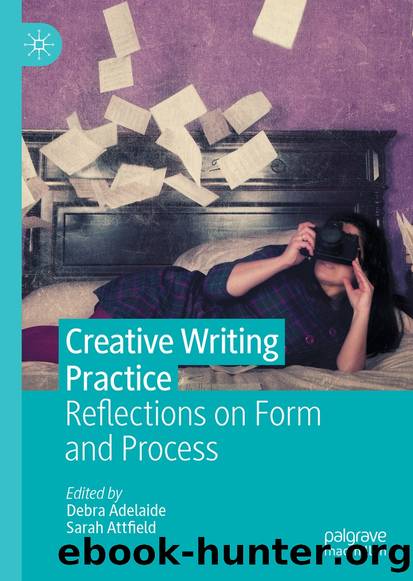Creative Writing Practice by Unknown

Author:Unknown
Language: eng
Format: epub
ISBN: 9783030736743
Publisher: Springer International Publishing
Keywords
PlotCharacterNarrativeAristotleHenry James
Introduction
A beginning writer looking at a blank screen is immediately faced with decisions. Where to start? For some, the answer is simple: Ernest Hemingway, in A Moveable Feast, describes sitting before his typewriter searching for âone true sentenceâ (Hemingway 1964), that everything will go on from. Joan Didion, in an interview in The Paris Review, adds that once youâve written that first sentence, youâre stuck with it. âEverything else is going to flow out of that sentence. And by the time youâve laid down the first two sentences, your options are all goneâ (Kuehl 1978).
They both make it sound easy, but, as all writers know, finding the opening to a story can be difficult. Those first sentences have to engage, intrigue and animate further reading. As Peter Brooks says, âOne could no doubt analyse the opening paragraph of most novels and emerge in each case with the image of a desire taking on shape, beginning to seek its objects, beginning to develop a textual energeticsâ (Brooks 1992, p. 37). But how to begin? What elements constitute this textual energetics? How is it generated?
Perhaps thereâs an idea of a situation taken from lived experience, a news story, or speculation, answering a âwhat ifâ or simply a âhowâ question. Conversely, there might be a character type in mind, again either from life or from imagination. What would it be like to be X or Y? Both these approaches can be immensely productive and while we can also add other more vague ones, such as wanting to write a thriller or a love story, or to explore a politics or a mood, the first two approaches are arguably clearer and more focussed.
Considering this pair in broad descriptive terms, the idea of a situation-based story can be expanded into something we can call âplotâ. A set of circumstances, a sequence of events triggering an outcome, perhaps known at the time of writing or, in the case of an imagined idea, often unknown. How might this work out or what might be the impacts on participants? The second type, about what it might be like to be a particular type of person, we can simply call âcharacterâ.
Having categorised our writing idea in one of these two ways, we can note thereâs a clear dynamic between them. Which is better, writing using plot or writing about character? Of course, this is really a rhetorical question, since as Henry James noted, âWhat is character but the determination of incident? What is incident but the illustration of character?â (James 2007, p. 470). Nevertheless, thinking about writing in binary terms can be valuable, as the following analysis and exercises will demonstrate.
When asked which is better, plot or character, the majority of students usually say writing about character is preferable and more interesting. Plot on the other hand can be pedestrian and even mundane. The publishing industry has an opinion too. Plot-based stories are associated with genre writing, where lots of things happen but there isnât much meaning, and
Download
This site does not store any files on its server. We only index and link to content provided by other sites. Please contact the content providers to delete copyright contents if any and email us, we'll remove relevant links or contents immediately.
Big Magic: Creative Living Beyond Fear by Elizabeth Gilbert(4718)
On Writing A Memoir of the Craft by Stephen King(4205)
Paper Towns by Green John(4163)
The Doodle Revolution by Sunni Brown(4034)
Hyperfocus by Chris Bailey(3259)
Evolve Your Brain by Joe Dispenza(3045)
Unlabel: Selling You Without Selling Out by Marc Ecko(2975)
The Red Files by Lee Winter(2908)
The Power of Mindful Learning by Ellen J. Langer(2705)
Draw Your Day by Samantha Dion Baker(2702)
The Art of Dramatic Writing: Its Basis in the Creative Interpretation of Human Motives by Egri Lajos(2409)
The War Of Art by Steven Pressfield(2394)
How to be More Interesting by Edward De Bono(2350)
Applied Empathy by Michael Ventura(2323)
The 46 Rules of Genius: An Innovator's Guide to Creativity (Voices That Matter) by Marty Neumeier(2305)
Why I Am Not a Feminist by Jessa Crispin(2236)
How to Stop Worrying and Start Living by Dale Carnegie(2215)
You Are Not So Smart by David McRaney(2171)
Keep Going by Austin Kleon(2154)
